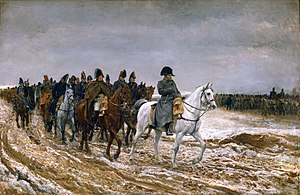Campaign in north-east France (1814)
| 1814 campaign in north-east France | |||||||
|---|---|---|---|---|---|---|---|
| Part of the War of the Sixth Coalition | |||||||
 Napoleon and his staff are returning from Soissons after the battle of Laon, by Meissonier |
|||||||
|
|||||||
| Belligerents | |||||||
|
|
|
||||||
| Commanders and leaders | |||||||
|
|
|
||||||
| Strength | |||||||
| Less than 80,000. | 370,000–405,000. | ||||||
Coalition victory
The 1814 campaign in north-east France was Napoleon's final campaign of the War of the Sixth Coalition. Following their victory at Leipzig (1813), Russian, Austrian and other German armies of the Sixth Coalition invaded France. Despite the disproportionate forces in favour of the Coalition, Napoleon managed to inflict many defeats, especially during the Six Days Campaign. However, the Coalition kept advancing towards Paris, which capitulated in late March 1814. As a result, Napoleon was deposed and exiled to Elba and the victorious powers started to redraw the map of Europe during the First Treaty of Paris and during the early stages of the Congress of Vienna.
Following defeats in the Wars of the Fourth and Fifth Coalitions, Prussia and Austria were forcibly allied with France during the Russian Campaign. When this campaign resulted in the destruction of Napoleon's Grande Armée, Prussia and Austria took advantage of this situation by forming a Sixth Coalition against France. The retreat from Russia turned into a new war on German soil, where Napoleon was decisively defeated at Leipzig. Most European countries then turned against Napoleon and started to invade France.
When the last of the French troops had crossed to the western bank of the Rhine, divided counsels made their appearance at the headquarters of the Coalition members. Even though the Russian Emperor Alexander I ordered the Coalition armies to push on, everyone was weary of the war, and many felt that it would be unwise to push Napoleon and the French nation to extremes. Hence a prolonged halt arose, utilized by the troops in renewing their equipment and so forth, but ultimately the Young German party, led by Blücher and the principal fighting men of the army, triumphed. The Coalition forces started to cross the Rhine with a three-part force:
...
Wikipedia
